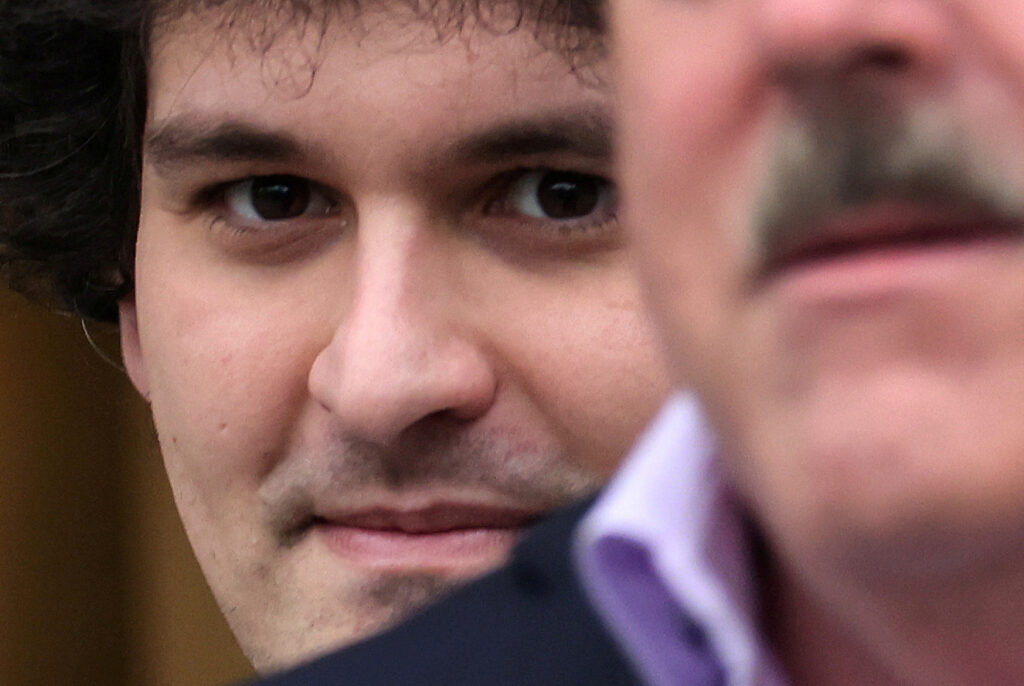Who is Sam Bankman-Fried, the onetime crypto mogul convicted of fraud?

FILE PHOTO: Former FTX Chief Executive Sam Bankman-Fried, who faces fraud charges over the collapse of the bankrupt cryptocurrency exchange, leaves federal court in New York City, U.S., February 9, 2023. REUTERS/Mike Segar/File Photo
NEW YORK—A few years after graduating from college, Sam Bankman-Fried grew worried he was not taking enough risks.
So the son of two Stanford Law School professors quit his Wall Street job and in 2017 started a cryptocurrency hedge fund, setting off a sequence of events that culminated on Thursday in his criminal conviction over what federal prosecutors have called one of the biggest financial frauds in U.S. history.
READ MORE: Former crypto tycoon Sam Bankman-Fried found guilty on all counts at fraud trial
Two years after launching a hedge fund, Alameda Research, Bankman-Fried founded FTX, an exchange that let users buy and sell digital assets such as bitcoin. Cryptocurrency valuations surged over the following two years, propelling Bankman-Fried to a net worth of $26 billion, according to Forbes magazine, before he turned 30.
He parlayed his wealth into political clout, becoming one of the biggest donors to Democratic candidates and causes ahead of the 2022 U.S. midterm elections. Based in the Bahamas, Bankman-Fried became known for his mop of unkempt curly hair and for wearing rumpled shorts, even when entertaining dignitaries like Bill Clinton.
In a cryptocurrency sector plagued by hacks and money laundering, Bankman-Fried hired celebrities including NFL quarterback Tom Brady and comedian Larry David to feature in advertisements portraying FTX as safe. He publicly backed efforts to regulate crypto.
But prosecutors say his laid-back demeanor combined with his cultivation of a responsible image concealed his years-long embezzlement of customer funds. They contend the theft came to a head in 2022, when crypto prices swooned and he used FTX funds to plug losses at Alameda.
His trial began on Oct. 4 in Manhattan federal court. Three former members of his inner circle, who have pleaded guilty and agreed to cooperate with prosecutors, testified against him and painted an unflattering portrait of his character, detailing instances in which he snapped angrily at colleagues and suggested his quirky persona was mostly an act.
“He said he thought his hair had been very valuable,” said Caroline Ellison, Alameda’s former chief executive and Bankman-Fried’s on-and-off girlfriend.
She said that ever since he started his career on Wall Street, “he had gotten higher bonuses because of his hair and that it was an important part of FTX’s narrative and image.”
Ellison and the other two cooperating witnesses, former FTX executives Gary Wang and Nishad Singh, have not yet been sentenced. Prosecutors may urge U.S. District Judge Lewis Kaplan to take their cooperation into account in determining their punishment.
Testifying in his own defense, Bankman-Fried, a Massachusetts Institute of Technology graduate, said he wore shorts and T-shirts because they were “comfortable” and that he did not often get haircuts because he was “busy and lazy.”
Bankman-Fried has pleaded not guilty to seven counts of fraud and conspiracy. He has acknowledged inadequate risk management, but denied stealing funds.
Bankman-Fried, now 31, testified that he made mistakes, such as not implementing a risk management team, that harmed FTX customers and employees. But he said he never intended to defraud anyone or steal customer money.
“We thought that we might be able to build the best product on the market,” Bankman-Fried said during his six hours of testimony in Manhattan federal court. “It turned out basically the opposite of that.”
BANKMAN-FRIED SOUGHT TO AVOID ‘COMFORTABLE’ PATH
Bankman-Fried had little crypto experience before founding Alameda, which initially made money by exploiting differences in prices in digital tokens between the United States and Asia. A physics major at MIT, he told an FTX podcast that he did not apply himself in classes and did not know what to do with his life for most of college.
But he grew interested during those years in a movement known as effective altruism, which encourages talented young people looking to make a mark on the world to focus on earning money and giving it away to worthy causes. That led him to take a job as a quantitative trader at Jane Street, but he began to doubt whether he was earning all he could.
“If I really think that I should be trying to maximize expected values, that probably implies substantially riskier strategies than what seems intuitively right,” he said in the June 4, 2020, podcast. “I should be careful not to fall prey to trying to choose a comfortable path.”
He brought on Gary Wang, an old friend from math camp, and later Ellison, a fellow effective altruist from Jane Street. Both would join him in the Bahamas, where they shared a $30 million penthouse with other Alameda and FTX executives, including Nishad Singh.
Bankman-Fried was jailed in mid-August, after U.S. District Judge Lewis Kaplan revoked his bail for likely trying to tamper with witnesses at least twice – including by sharing Ellison’s private writings with a New York Times reporter.
“There will probably never be anything I can do to make my lifetime impact net positive,” Bankman-Fried said in his own private writings following his arrest, which he shared with a social media influencer who gave them to the Times. “And the truth is that I did what I thought was right.”
Disclaimer: The comments uploaded on this site do not necessarily represent or reflect the views of management and owner of Cebudailynews. We reserve the right to exclude comments that we deem to be inconsistent with our editorial standards.
